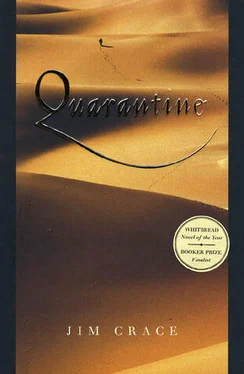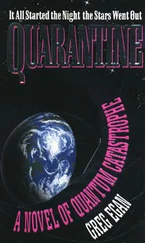Jim Crace - Quarantine
Здесь есть возможность читать онлайн «Jim Crace - Quarantine» весь текст электронной книги совершенно бесплатно (целиком полную версию без сокращений). В некоторых случаях можно слушать аудио, скачать через торрент в формате fb2 и присутствует краткое содержание. Год выпуска: 1998, Издательство: Straus and Giroux, Жанр: Современная проза, на английском языке. Описание произведения, (предисловие) а так же отзывы посетителей доступны на портале библиотеки ЛибКат.
- Название:Quarantine
- Автор:
- Издательство:Straus and Giroux
- Жанр:
- Год:1998
- ISBN:нет данных
- Рейтинг книги:4 / 5. Голосов: 1
-
Избранное:Добавить в избранное
- Отзывы:
-
Ваша оценка:
- 80
- 1
- 2
- 3
- 4
- 5
Quarantine: краткое содержание, описание и аннотация
Предлагаем к чтению аннотацию, описание, краткое содержание или предисловие (зависит от того, что написал сам автор книги «Quarantine»). Если вы не нашли необходимую информацию о книге — напишите в комментариях, мы постараемся отыскать её.
Quarantine
Quarantine — читать онлайн бесплатно полную книгу (весь текст) целиком
Ниже представлен текст книги, разбитый по страницам. Система сохранения места последней прочитанной страницы, позволяет с удобством читать онлайн бесплатно книгу «Quarantine», без необходимости каждый раз заново искать на чём Вы остановились. Поставьте закладку, и сможете в любой момент перейти на страницу, на которой закончили чтение.
Интервал:
Закладка:
They stood hand in hand in the ducking candlelight and the plumes ofclearingsmoke looking at the wrapped body, uncertain where to start. Only his hands and feet were visible, and so they cleaned them first with water taken from his grave. His skin was cold and dry. Despite the broken nails, the blisters and the sores, his hands and feet were still beautiful, as polished and unyielding as sculpted wood. The fast had thinned and lengthened his toes and fingers, so that the bones and joints were round and ripe like nuts in pods. The women unwrapped him from his curtain, removed the poppy petals from his eyes, and stood back to let the candles light his face. Marta gasped. She touched the Gally’s cheeks and lips, and shook her head. She was almost smiling, for the first time that day.
‘What’s wrong?’ said Miri. ‘Are you all right? Sit down. I’ll do it by myself’
‘No, let me help. I want to help.’ Marta touched his cheeks again. ‘I’m not afraid of him. He’s only skin and bone.’
The women covered Jesus’s face with a cloth, to protect his mouth against the devil and to protect themselves from the dangers oflooking a dead man in the eye for too long. That was the superstition, ‘Dead eyes looking, Bad luck cooking.’ But neither of them felt ill at ease withJesus. Nor did they feel much reverence for him. His body was too damaged and degraded. Only his feet and hands had caused any wonder. The rest had been more cruelly treated by the fast and was not beautiful. But touching him was not distasteful. It felt more like a blessing than a chore. They’d have good luck, not bad. Miri and Marta did not talk while they were preparingJesus. Their task was far too sole^rn and distressing. He was so young and disfigured. But they were glad they could at least share and halve the task with each other. They washed his body, wiped away the dried blood, the film of dust and ash, and cleaned his eyes and mouth and loins. They shut his eyes and pulled his lips over his teeth as best they could. His gums were so badly swollen that his mouth would not close. His grin was wide and mirthless. They anointed him with the herbs and ointments they’d coUected, and burnt the seeds for incense in the candle cups. Finally they bandaged his feet and hands, and wrapped him in the curtain once again. They’d done as much as any woman could. Now it was men’s work to carry him down to the cistern, and bury him. No woman should come near the grave. Miri and Marta stayed inside the cave, watching candle flames while Jesus was interred.
‘What was the matter, when you saw his body?’ Miri asked. ‘You gasped. You seemed surprised by him.’
‘I knew his face,’ Marta said. ‘Dear lord, how well I knew his face. That’s how I always knew his face would be.’
‘How could you know his face? You never saw him. You always said he wouldn’t come out ofhis cave.’
‘I know his face from dreams. Ifit was dreaming.’
‘You dreamed his face?’
‘A hundred times. Even this morning. Outside the cave. .’ ‘He was dead this morning! You’ve seen yourself how dead he was.’
‘I watched somebody walking up. I hid. I thought it was your. . Don’t make me even say his name. You know. Then I saw him. I knew it had to be the Gally. The same dead face. Just skin and bones. He was as near to me as you are now. I could have touched him. But he touched me. He touched my cuts and bruises. And then he kissed my feet.’
Miri laughed. ‘That only happens in a woman’s dreams.’
‘He touched my stomach afterwards, like a priest. He said, This is a son for Thaniel. How could he know my husband’s name? He said he’d given me a child, with just his fingertips.’ ‘That’s something else that only happens in a woman’s dreams.’
Outside, there was no wailing at the funeral or any ululations to ala^ the women. The men did not tear their clothes, or chastise themselves, although chastisement was deserved. But each of them, including Shim, touched the Gaily’s bandaged foot, which still protruded from its curtain shroud. They prayed for further miracles. They had to treat his death not as a setback but as an opportunity, a chance to be restored by the blessing ofhis spirit passing through them on its voyage to his god. Musa prayed the hardest of them all. A touch, a touch, the merest touch, to save him from the world.
The grave had been ankle-deep in water, but the badu, always happy to amuse himself with stones, had lined the bottom so that the bed was hard but dry. They lifted Jesus — all four men as bearers, a limb apiece — and lowered him into the grave, face down. They could presume he was a bachelor, without offspring. He seemed as weightless as a child. What married man or father would leave his family to starve himself to death like this? They sacrificed the wheatear with Musa’s ornamented knife. Its blood pumped on the curtain shroud. Musa dropped its body at the healer’s feet. They filled the grave with earth and stone, hardly speaking to each other, and not looking in the grave until the body was entirely covered. Even Musa kicked a little earth into the grave and sighed as often as he could.
‘This death is hard for me,’ he said, not entirely without truth. ‘I was the only one who really knew the man.’
They marked his grave with forty stones. It seemed appropriate. Their mourning ought to last for three days at the least, they knew. No one should walk or make a fire or cook. They should not wash or shave. They should wear dirty clothes, if they were truly dutiful. But they were not his fa^mily and need not spare three days for mourning. His was a stranger’s death despite their vigils at the precipice and aH the hopes they’d spent on him. If they were at all despondent, it was because his death showed how much they’d failed themselves. This was only the thirty-first of their forty days, but it would be their last. How could they boast of that, down in the valleys, in the towns? The healer was a disappointment. He’d betrayed them all by dying. Their water cistern had been sacrificed. The tent was flattened. So were they. They’d leave at dawn and put an end to quarantine. There was no choice. The wind had blown all the spirit out of them. The scrub was telling these six trespassers to go.
29
The badu disappeared that night. So did the goats. When everybody came down from the caves at dawn to salvage what they could from the tent for their descent to the valley, the only sign of any animals was dung. Musa checked his store of treasures with which he planned to reassert himselfin the summer markets to the north. He opened up the saddle-pack with shaking hands. He halfexpected to find the badu had replaced his treasures with a rock, but everything was there, untouched. The twist ofBerber cloth containingjewellery, some coins and a little gold; the seven perfume bottles.
‘Some thief!’ said Musa.
But still the landlord and his tenants were surprised by the badu. He wasn’t quite as mad as they had thought. He hadn’t had to hand over his silver bracelets to Musa on the last day, as Musa had intended. He hadn’t paid a coin for his food or rent or water. He hadn’t even worked for them, by portering his landlord’s goods down to the road forJericho as he had promised. And now he had six goats to milk or eat or sell. A decent profit on his thirty days of idleness.
Musa cursed the hundred comers of the sky, and prayed that every demon of the scrub would lie in wait for the little thief with snares and thorns and traps, that he would fail into some pit and starve. But no one really thought the badu would come to any harm. They’d seen him clamber on the precipice. The deepest pit could not imprison him. They’d seen him come back to the caves with deer, and wheatear, and with honeycombs. He couldn’t starve. Besides, he had six goats as his companions. It was almost pleasing, to think of them, the hennaed badu and the swart-haired goats, their bleating conversation and their dainty steps, making their escape across the scrub. Aphas and Marta, Miri even, wished the badu well. He’d bettered Musa. They’d dreamed of doing something similar themselves.
Читать дальшеИнтервал:
Закладка:
Похожие книги на «Quarantine»
Представляем Вашему вниманию похожие книги на «Quarantine» списком для выбора. Мы отобрали схожую по названию и смыслу литературу в надежде предоставить читателям больше вариантов отыскать новые, интересные, ещё непрочитанные произведения.
Обсуждение, отзывы о книге «Quarantine» и просто собственные мнения читателей. Оставьте ваши комментарии, напишите, что Вы думаете о произведении, его смысле или главных героях. Укажите что конкретно понравилось, а что нет, и почему Вы так считаете.












